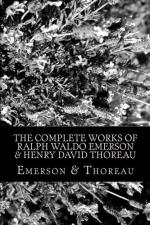|
This section contains 9,372 words (approx. 32 pages at 300 words per page) |

|
SOURCE: Burbick, Joan. “Henry David Thoreau: The Uncivil Historian.” Bucknell Review 28, no. 1 (1983): 81‐97.
In the following essay, Burbick analyzes Thoreau's views concerning the treatment of history, including his disdain for historical approaches that rely on romantic and novelistic techniques.
By the first half of the nineteenth century, Americans were searching for histories that would justify their actions both at home and abroad. The romantic historians of this period in part satisfied this demand, creating stories that sustained the ideal of progress, the triumph of civilization, and the necessary control of “primitive” forces. George Bancroft, one of the most noted of these, has been judged as a man who “saw the American past as a great play, written by God and man together, moving toward a triumphant last act in which the promise of the Christian tradition and the Age of Reason came true.”1
In the 1830s, Thoreau also adhered...
|
This section contains 9,372 words (approx. 32 pages at 300 words per page) |

|


